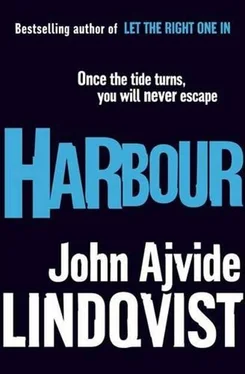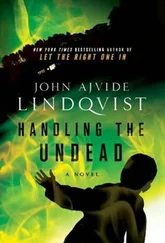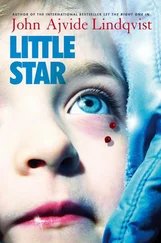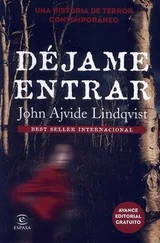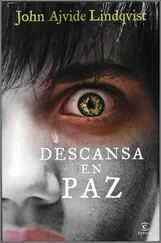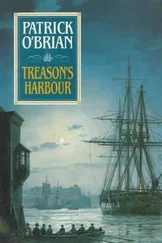Anders waved his letter. 'So what shall I do with this, then? It's a film to be developed. I wouldn't like it to get lost.'
Mats took the letter and promised he would make sure it was sent. Then he gave out the post to those who were there. No letters for Simon, just a newspaper, Norrtelje Tidning, and an advert for some pension fund.
As Simon and Anders set off home, Göran said, 'You won't forget, will you?'
'No,' said Simon. 'I'll call round one day.'
They took the route along the shoreline. The jetties belonging to the summer visitors were more or less empty. The odd individual would probably come out at the weekend, but otherwise the season was over for this year.
'What is it he doesn't want you to forget?' asked Anders.
'Göran moved back here a while ago, when he retired. But he hasn't got a well, so he wanted me to go over with my divining rod to find him some water.'
'How do you actually do that?'
'Practice, practice and more practice.'
Anders punched Simon playfully on the shoulder. 'Stop it. That isn't magic. I really am interested.'
'Well, it is a kind of magic, you know. Are you coming in to see Anna-Greta?'
Anders dropped the subject. For a number of years Simon had been the local water diviner. Whenever anyone needed to sink a well, it was to Simon they turned to find a spring. Simon would come, walk around with the rowan twig that was his divining rod, and eventually point out a suitable spot. He hadn't been wrong yet.
Anders snorted. 'Holger seemed to think I was the one who smashed up the mailboxes.'
'You know his wife drowned last year?'
'Sigrid? No, I didn't know that.'
'Went out in the boat to check the nets and never came back. They found the boat a few days later, but not Sigrid.'
Sigrid. One of the few people Anders had been genuinely frightened of when he was little. An overfilled cup just waiting for the drop that would make it run over. It could be anything. The weather, the sound of bicycles, a wasp that came too close to her ice cream. Whenever Anders sold her some herring he would make a point of picking out the biggest and best, and preferred to give her too much rather than a single gram too little.
'Did she drown herself?'
Simon shrugged his shoulders. 'I suppose some people think so, but…'
'But what?'
'Others think Holger did it.'
'Is that what you think?'
'No. No, no. He was much too frightened of her.'
'So now he's only got the Stockholmers left to hate?'
'That's right. But he can put even more energy into it now.'
This aversion towards people from the capital is not unique to Domarö, or even to Sweden. It exists everywhere, and sometimes with good reason. Holger's story is representative of what has happened in the Stockholm archipelago generally, and on Domarö in particular.
Just like Anders and many others on Domarö, Holger came from a family of pilots. Through a series of clever acquisitions, marriages and other manoeuvres, the Persson family eventually ended up owning the entire north-eastern part of Domarö, an area covering some thirty hectares, measured from the shoreline inland, and comprising forest, meadows and arable fields.
This was what Holger's father had to look after when he came of age at the beginning of the 1930s. Summer visitors had begun to come, and like many others on the island he had a couple of boathouses done up and extended so that he could rent them out.
To cut a long story short, however, there were debts in the family, and Holger's father had an unfortunate tendency to hit the bottle when things were not going well. One summer he got to know a broker from Stockholm. Generous amounts of alcohol were proffered, and fraternal toasts shared. There was even talk of Holger's father becoming a member of the Order of the Knights Templar, the legendary masonic lodge headed by Carl von Schewen.
Well. Somehow the whole thing ended up with Holger's father selling Kattudden to the broker. A piece of land measuring about fifteen hectares where no trees grew and the grazing was poor. He got a price that was rather more than he would have expected if he'd sold the land to another islander.
But of course the broker was not interested in either grazing or forestry. Within a couple of years he had divided Kattudden into thirty separate plots, which he then sold to prospective summer visitors. Each plot went for a sum approximately half what he had paid for the whole piece of land.
When Holger's father realised what had happened, how thoroughly deceived he had been by the broker, the bottle was waiting to console him. At this point Holger was seven years old, and was forced to watch as his father drank himself into a morass of self-pity, while the Stockholmers happily erected their 'summer cottage' kit homes on land that had belonged to his family for generations.
A couple of years later his father took his shotgun out into the forest they still owned, and didn't come back.
Different versions of this story are told on many of the islands in the archipelago, but this was the Persson family's version, and it is undeniably one of the uglier tales. These transactions have given rise to a great deal of bitterness everywhere, and Holger was the most bitter of all.
His basic thesis was simple: Stockholmers were the root of all evil; some were guiltier than the rest, and the biggest villains of them all were Evert Taube and Astrid Lindgren.
Holger never tired of explaining his thesis to anyone who was prepared to listen: the archipelago had been a living community with a hard-working population, until Evert Taube came along and romanticised the whole thing, with his 'Rönnerdahl' and 'Calle Schewen's Waltz'. The real Carl von Schewen had become something of a recluse in his old age, thanks to all the curious Stockholmers who took a trip out to his jetty or lay there spying on him through telescopes from their boats to see if Calle might be busy building a haystack or dancing with the rose of Roslagen.
But this was merely a boring detail under the circumstances. The worst thing was that Taube's romantic portrayal opened the eyes of the Stockholmers to the archipelago, where people wore flowers in their hair, danced to the sound of the accordion and enjoyed a little drink in a picturesque manner. Those who could afford it bought themselves a summer cottage. The plots were bought up, and the archipelago became depopulated.
Just as the worst of the frenzy was dying down and the residents of the archipelago began to think they might be able to relax, the killer blow came with Astrid Lindgren's book Life on Seacrow Island, and the subsequent TV series. Now it wasn't only the rich who had to have a summer cottage. Brokers bought up everything they could get hold of in order to build small houses which they could sell or rent out by the week or month. Everybody wanted to go to the archipelago, to have exactly the right knack for starting up an outboard motor, and to find a pet seal of their very own.
The young people of the archipelago got to know the summer visitors, and began to long for the nightclubs and cinemas of the capital. Houses and farms were left with no one to inherit them, and of course the brokers popped up again, buying everything in sight until the archipelago resembled a corpse that came to life for a couple of months in the summer, then sank back into its silent grave.
This was the gist of Holger's thesis, and he would usually end with some detailed fantasy concerning what he would like to do to Evert and Astrid if they were still alive. These were terrible things involving both lead weights and petrol, and he would brook no contradictions.
The archipelago had been romanticised to death. That was Holger's considered opinion.
Читать дальше
